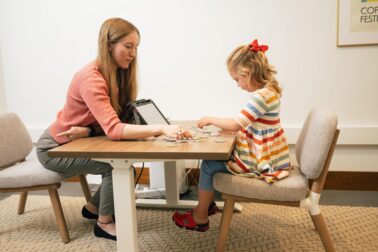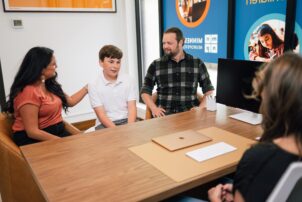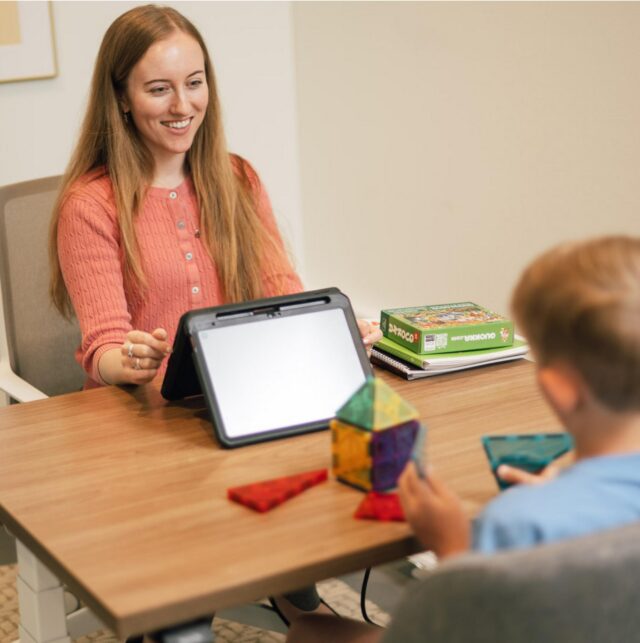Nurturing Potential
Comprehensive Evaluations for Your Child’s Bright Future
Every child’s mind is uniquely brilliant, with its own way of processing, learning, and experiencing the world. Whether you’re exploring ADHD testing, dyslexia assessment, or other concerns, we help our clients understand and celebrate these differences while providing guidance around the best support to help your child soar.
Evaluations with a Complete Perspective
It isn’t easy to know what is causing your child’s challenges or where to turn for answers. You might notice difficulties at school, low self-esteem, or behavior issues. Our personalized, one-day neuropsychological evaluations take a “whole-child” approach—going beyond ADHD testing alone to identify important patterns and co-occurring conditions that might otherwise go unnoticed. Our goal is to bring awareness to your child’s extraordinary potential and equip you with the knowledge to support them where they need it.



What We Assess
Our evaluations cover a range of concerns, including ADHD testing, learning differences, gifted/twice exceptional, and mood/anxiety/behavior concerns:
-
ADHD/ADD
Attention and executive functioning challenges in daily life, including often-overlooked presentations and how ADHD manifests differently in girls.
-
Reading & Writing (Dyslexia/Dysgraphia)
Literacy skills, identifying challenges like dyslexia or dysgraphia.
-
Math Skills (Dyscalculia)
Mathematical reasoning to identify learning differences like dyscalculia.
-
Gifted & Twice Exceptional (2E)
High intellectual aptitude alongside neurodiversity, needing support for both talents and challenges.
-
Social & Behavior
Defiant behavior, explosive episodes, and social communication difficulties.
-
Mood & Anxiety
Anxiety disorders, depression, and OCD that interfere with daily functioning and emotional well-being.
The Evaluation Day
Our neuropsychological evaluations for children and adolescents (ages 6-18) are comprehensive and personalized. We identify your child’s unique strengths, areas needing additional support, and diagnose conditions like ADHD, dyslexia, dysgraphia, and other learning differences, as well as social, emotional, and behavioral conditions. Here’s what to expect throughout the evaluation:
-
Assessment Day:
Understanding Your Child Starts HereThe evaluation takes place over one day, typically from 9:00 a.m. to mid-afternoon, and is thoughtfully structured to provide a comfortable experience.
- The Parent’s Experience: You’ll meet with the neuropsychologist in the morning to complete questionnaires, and discuss your specific concerns. We will ask relevant questions about your child’s history and functioning to provide a comprehensive and personalized assessment. While your child meets with our specialists, you can relax in our spacious waiting room and visit nearby shops. For older children, you may run errands and return by lunchtime.
- Your Child’s Testing Experience: Our specialists combine clinical expertise with genuine care, creating a welcoming environment where your child feels comfortable and supported. We explore cognitive functioning through puzzles, questions, and assessments, including IQ, academic skills, and attention. Testing activities include verbal tasks, building, drawing, problem solving, and academic tasks like reading, writing, and math. Many activities are administered in an interactive format using iPads and others involve hands-on work with blocks, small pegs, or paper and pencil.
-
Same-Day Results: Clarity & Next Steps Before You Leave
At the end of the day, you will meet with the neuropsychologist to discuss the evaluation results, any relevant diagnoses, and recommendations for next steps such as specialized tutoring, therapy, coaching, or medication. You’ll gain insights into your child’s strengths and areas where additional support is needed.
-
Full Report: Your Roadmap for What Comes Next
At the end of the day, you will meet with the neuropsychologist to discuss the evaluation results, any relevant diagnoses, and recommendations for next steps such as specialized tutoring, therapy, coaching, or medication. You’ll gain insights into your child’s strengths and areas where additional support is needed.



Diagnostic Care from a Compassionate Team
We provide comprehensive, data-driven evaluations—including ADHD testing, dyslexia assessment, and more—in two welcoming Minneapolis/St. Paul settings. Whether you visit our Cathedral Hill or Wayzata location, you can expect a caring and compassionate team. Our neuropsychologists work hand-in-hand with our team of assessment specialists (psychometrists) to ensure that your child has a positive and engaging evaluation experience. Our mission is to provide a comprehensive diagnostic evaluation that empowers children of all ages to understand their brain and go forward confidently.
Thank you so much for this detailed, thorough report. We are grateful for the wealth of information and the thoughtful strategies and recommendations you’ve provided to help support our child as they grow. We are grateful, too, for a wonderful experience on the day of testing. It was a big day for our family, but it was so clear that we had entrusted him to such capable and compassionate hands!
Receiving the diagnosis has turned out to be a turning point for my child. His attitude has shifted from not feeling good enough to knowing why his brain works the way it does. With the diagnosis we were able to get him the services he needed in school. It is so exciting to see his progress.
I wanted to start out by saying thank you so much for your dedication. I felt so at ease working with you all. I wanted our child to have the best experience. I know it was a long day for him, but you all made him feel so comfortable. We are glad to have some answers and tools for helping him along this journey. What an amazing team!! I could not be happier!
We had such a great experience at MNNP and appreciate the detailed report. I met with my child’s teacher and she said it was one of the best reports she’s ever read. I just wanted to pass that on to you and let you know that all the details you included in here, we so appreciate it and it’s been amazing.
Frequently Asked Questions
Below are common questions about our comprehensive diagnostic evaluations offered in the Minneapolis/St. Paul area, with offices in Wayzata and Cathedral Hill. For answers to questions about specific conditions, please visit our dedicated pages: ADHD, reading and writing difficulties, dyslexia, math and dyscalculia, gifted and twice-exceptional (2E) learners, and social, emotional and behavioral conditions.
Why should I choose Minnesota Neuropsychology?
We believe that outside-the-box thinkers move our world forward. We celebrate the people in our world who live and learn differently, who forge their own paths, and who teach us by bringing their unique perspective to the world. We want to empower your child to live their best life and achieve their full potential.
Here are a couple of highlights that set us apart:
- Quality and Timeliness: When your child is struggling, we understand how important it is to get the right support in a timely manner. Our extensive training and experience in pediatric neuropsychology and our investment in the latest technology allow us to provide the highest quality evaluations efficiently and effectively. We strive to keep our waitlist under 2 months. Evaluations (including interviews, testing, and feedback) are completed in one day, and reports are available the next week so you can start taking the next steps immediately.
- Experienced and Connected: Our team of neuropsychologists has the highest level of training in pediatric neuropsychology, with specific expertise in dyslexia, ADHD, and gifted children. Together, they have established relationships with tutors, coaches, and therapists in the Twin Cities area to facilitate the next steps for interventions and accommodations.
- Whole-Child Approach: Because of our neuropsychologists’ specialized training and experience, they have a deep understanding of neurodiversity and other relevant factors that may be affecting your child. They will listen to your concerns with the utmost care and compassion and provide an evaluation uniquely tailored to your child.
- Positive and Strengths-Based Approach: We believe a neuropsychological evaluation can help provide a deeper understanding of the root cause of struggles and identify an individual’s strengths. With a clear understanding of each person’s unique brilliance and challenges, we open doors to personal growth and lifelong success.
- Data-Driven: Our evaluation method minimizes personal bias and provides high validity through standardized data collection. Our use of the latest technology allows our neuropsychologists to monitor scores and develop recommendations in real time.
Curious about the principles that fuels our team and decisions? Learn About Our Core Values and Mission
My child is in high school. Did we wait too long?
It’s never too late to get an evaluation to gain clarity on your child’s strengths and challenges. Getting a diagnostic evaluation before your child graduates from high school is always helpful to ensure they have the support needed to thrive when they are off living on their own.
My child is young. Should I wait until she’s older?
We love to see young children so we can catch any challenges early, and get the support in place to help their success in school and life. We see kids for evaluations starting at age 4 (see our Evaluations for Preschoolers). There are many benefits to getting an evaluation at any age, but especially when a child is showing early signs of struggles, as research highlights the importance of early intervention. If your gut is telling you something is off, like at home, at preschool, or with peers, it can be helpful to learn early how to best support your child. A neuropsychological evaluation can help you understand your child’s specific strengths and challenges and offer comprehensive recommendations to set your child up for success from an early age.
The following factors could put your child at greater risk for learning disorders, ADHD, and/or social/emotional or behavioral challenges:
- Major medical conditions (e.g., epilepsy, congenital heart disease)
- Family history of ADHD or learning differences
- Premature birth
- Low birth weight
- Birth complications
- Prenatal substance exposure
- Genetic disorders
- History of institutionalized care and/or foster care prior to adoption
What types of diagnoses can you test for?
Our evaluations are comprehensive, and our neuropsychologists are well-versed in assessing a wide variety of diagnoses, such as:
- Dyslexia
- Dysgraphia
- Dyscalculia
- ADHD
- Anxiety
- Depression
- Social and/or behavioral disorders
If you are concerned that your child may also have autism, please notify our team when scheduling your evaluation. We will discuss evaluation options and availability for autism assessments.
How is your evaluation different from a school evaluation?
A neuropsychological evaluation is more comprehensive than a school evaluation and includes various aspects of cognitive function, including IQ, attention, executive function and academic performance. It can also assess social, emotional and behavioral concerns as well as incorporate any medical and family history factors that school evaluations typically cannot address.
School evaluations can identify if a child is struggling but they do not address the underlying cause. School psychologists cannot provide ADHD testing or dyslexia assessments.
What types of recommendations do you provide?
Our goal is to provide information that explains the diagnosis, what types of support may be needed, and what you can do to help. Generally, there are three categories of recommendations:
- At School – we can provide specific recommendations for academic accommodations and support to enhance learning. If an IEP or 504 Plan is indicated, the neuropsychologist will explain that process to you and provide written recommendations the school can use.
- Outside of School – we may suggest therapy, medication consultations, tutoring, coaching, or referrals to other specialists like physical therapists, occupational therapists, speech therapists, or neurologists.
- At Home – we may suggest strategies for helping children succeed during homework time, how to manage big emotions, how to support social skills, and other relevant tools.
We do not prescribe medication or provide therapy, but we have a strong local referral network to help connect you with relevant providers.
What if there is no diagnosis?
Some children struggling in school or other aspects of life might not meet the necessary criteria to receive a clinical diagnosis. Even if there isn’t a diagnosis, parents often appreciate the information they learn about their child. An evaluation provides valuable insights into your child’s cognitive strengths and challenges, along with a set of supports and next steps that are uniquely tailored to your child.
What does the testing involve?
Our evaluation includes tasks like working with blocks, answering verbal questions, working with an iPad, and using pencil and paper. We use standardized tests to assess intelligence, verbal skills, visual spatial skills, learning, memory, attention, and executive skills such as planning and organizing, regulating emotions and behavior, starting and following through on tasks.
We also assess reading, writing, and math abilities, along with social, emotional, and behavioral functioning. All evaluations include parent and teacher questionnaires and a parent meeting with the neuropsychologist.
If my child was previously tested, should I bring the results?
If your child has been evaluated previously, those documents are helpful for the neuropsychologists to review ahead of time. Please upload any prior evaluation documents to the client portal when completing your initial paperwork.
Do you accept insurance?
We believe it’s important to provide a comprehensive evaluation for each child. Unfortunately, insurance companies set very specific requirements about how much time can be spent on portions of an evaluation, which often greatly limits the ability to be comprehensive. Minnesota Neuropsychology is an out-of-network provider, which means we do not bill or accept payment from insurance directly. By not accepting insurance, we can focus on providing the best possible service to our clients with the most up-to-date tools, research, and thorough and personalized evaluations.
Some insurance plans offer partial reimbursement for neuropsychological evaluation services. If your insurance does provide partial reimbursement, we provide a “superbill,” which is the document insurance requires for out-of-network reimbursement. Please be aware that insurance reimbursement varies by provider and plan, and not all offer reimbursement.
Please read our Fees & Payments web page for important details.
How can I prepare my child for the evaluation?
Children are naturally curious and may have questions about their upcoming evaluation. To help put your child at ease, we suggest explaining that the appointment is similar to a day at school. They will work together with one of our friendly staff to complete various activities, including building with blocks, doing puzzles, and playing memory games. They will do some reading, writing, and math tasks too. These activities will help us learn what tasks are easy for your child, what might be harder for them, and how their teachers and parents can provide the best support for their learning and development.
Children should be reassured that they cannot study for these tasks and are only expected to do their best. Acknowledging their effort with a small reward or treat following the evaluation can be helpful too.
Children should maintain their regular routines, including getting a good night’s sleep, eating breakfast and taking any prescribed medications as usual.
Related Articles
Request an Evaluation
Every child deserves to feel confident in their learning journey. Our assessments provide clear insights for your child’s development and success. With typical wait times under two months, schedule today to discover your child’s unique brilliance.




